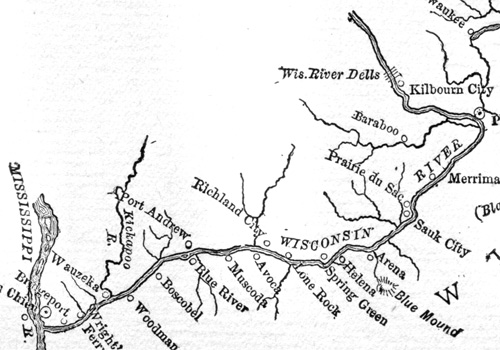“It is not necessary to go to the Maine lakes for canoeing purposes; or to skirt the gloomy wastes of Labrador, or descend the angry current of a mountain stream. Here, in the Mississippi basin, practically boundless opportunities present themselves, at our very doors, to glive through the heart of a fertile and picturesque land, to commune with Nature, to drink in her beauties, to view men and commmunities from a novel standpoint, to catch pictures of life and manners that will always live in one’s memory.”
— Reuben Gold Thwaites, Down Historic Waterways
I often capitalize the Wisconsin River when I write about it, as in “The River.” People have noticed it and remarked that it’s a curious thing, but no one has ever asked me why. Maybe it’s obvious. I am Monofluvialist. Though there be streams many and rivers many, to me there is only one River.
This doesn’t mean that I won’t paddle other rivers. Unlike most deities, my river is not a jealous river. She is content to let me drift down other rivers, so long as I return home to her periodically. We have a good relationship. I understand her, she understands me.
If this sounds like I’m being flippant or even mocking of religion, let me assure you that I am not. Martin Buber pointed out fifty years ago that you can have a relationship with a person and treat that person like a thing, keeping distance from it, making it an object. Sadly, this is all too common…the ability to connect with someone is becoming lost, and Buber knew this. “All real living is meeting,” he said.
I admit to having a Buberian I-Thou relationship with my River. I love her, and we do communicate. I’ve spend so much time with her over the years that I can sense things on her river than I would miss on other rivers. Wind, current, shifting sands and islands…not sure, but I usually know what’s happening intuitively before I realize it cognitively.
“The traveler by rail has brief and imperfect glimpses of the landscape. The canoeist, from his lowly seat near the surface of the flood, sees the country practically as it was in pioneer days, in a state of unalloyed beauty.”
I’ve paddled all 83 miles from the last dam to the confluence with the Mississippi, many of the sections more than a dozen times. Sometimes with a group, sometimes solo; it doesn’t matter. I just love being with the River. I hold no illusion that she somehow protects me…it’s not that sort of relationship. She has spanked me hard and humbled me, but she has also allowed me to snooze unmolested on a sunny January day by creating a little windbreak where a guy could climb under his canoe, light a small fire and fall fast asleep.
Marquette and Joliet were not as taken with my River as I was. My guess is that they were a bit jaded after the difficulties they encountered (and would continue to encounter).
“The river on which we embarked is called Meskousing. It is very wide; it has a sandy bottom, which forms various shoals that render its navigation very difficult. It is full of islands covered with vines. On the banks one sees fertile land, diversified with woods, prairies, and hills. There are oak, walnut, and basswood trees; and another kind, whose branches are armed with long thorns.”
Plus ça change…that description would be recognized today as spot on. I would have added a few more adjectives describing the beauty of the place, but they were documenting, not writing prose.
Reuben Gold Thwaites is long gone, but his words live on in dusty little tomes with gorgeous covers (gold embossing!). Not by any means a best-selling author, he joins August Derleth, Ben Logan, George Vukelich, and Aldo Leopold (among many others) in a small confraternity of Wisconsin authors who knew how to write about things because they actually do the things they write about. Trust me, the number of people who still do things is shrinking daily.
Reuben was the editor of the Wisconsin State Journal during the late 1800s. That was before AP and the wires that provide the same damn thing to every newspaper in the country. The WSJ has fallen victim to the same cost-cutting culture-ruining business tactics that has made pablum where there used to be good, meaty articles, written by locals. The WSJ still has some local writers, but the ones I know from years ago have had their wings clipped a little (or a lot). Some retired when they saw the writing on the wall (“offend no one, especially advertisers” is what I think it said). Whatever happened, it’s not germane here, and I again digress.
The point is that R.G. Thwaites was a journalist who took the time to paddle across the Great State of Wisconsin, from Green Bay to Prairie du Chien, and documented it beautifully. He got his feet wet, and what we have these days, in my honest opinion, is too many people with dry feet. Reuben loved my River, and I hope to someday meet him, shake his hand in thanks, and go for a paddle together.
Respectfully submitted,
Canoelover
P.S. Meskousing became Ouisconsan which became Wisconsin. Pere Marquette’s description is the first recorded name of the state I call home, over 350 years ago.


